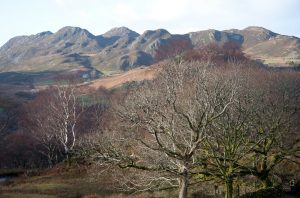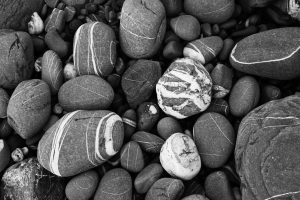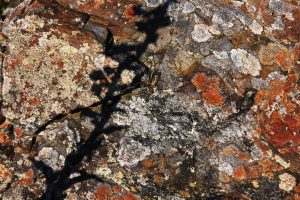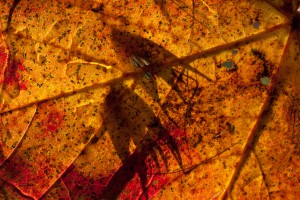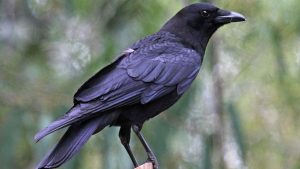Mountain Path
“The way up and the way down are one and the same.” Heraclitus
If the path is steep and stony on the way up the mountain and if, perhaps, it crosses several streams or rivulets (depending on the weather these streams may become great, rushing waters) and, if there are fields of sharp stones to cross, and an old sheep byre, a stand of ancient pines (wind-blown, leaning like old women) and a square of summer pasture – if these things are passed on the way up they will, if you take the same path down, be passed as you leave. However, the path down is not, and can never be, the same as the way up. By now you are tired and in need of a sandwich or a chunk of Kendal mint-cake and your view is different because you are not looking up at the crag anymore and the scudding, reckless clouds which resemble the gathered sheep on the ridge – now the mountain is behind you are you are seeing a tarn edged with reeds which for some reason you did not notice on the way up and you also see the skull of sheep, bleached white by the weather. In addition the clouds have flocked together like the sheep and there is less sunlight although from time to time shafts of yellow illuminate the wintry grass and turn it almost white against the darkness and this is something that spellbinds you in a way you were not spellbound on the way up because you were perspiring heavily in spite of the cold wind and your straining heart thudded loud in your chest while now, on the way down, you only have the twinge in your knee to worry about. On the way down you do not stop at the same spots as on the way up and in any case even if you did, these same spots cannot be the same spots because, as you know, the earth spins around the sun and therefore, because time has elapsed, these points cannot be the same points as they were. You must conclude that the path up is never the same as the path down, no matter how careful you are to tread in the same footsteps and it cannot escape your notice that your footsteps on the way down are now upside down or perhaps they are now the right way up – this you cannot be sure of. All you can be sure of is the mountain itself and even this is an illusion.
Stones
Old stones, holed stones, quartz stones, veined stones, green, grey and red stones, small stones, pebble stones, shingle stones, big stones, boulders, mountains and glacial erratics. Stones on the beach and the path, under my toes, dropped from the sky. Smooth stones, rough stones, wondrous stones, igneous stones, metamorphic stones. Stones from the Cambrian, the Ordovician, stones I found last week. Stones in my pocket, on the sill, stones by the door. Stones from Greece, the Hajars, from Harlech, and who knows where. Stones in the walls, the church, the mosque, the synagogue, the temple. A life, a civilisation of stones.
A straight road
Gravelly underfoot and scattered with puddles that reflect the sky, the straight road cuts through the hills. No one knows how old this road is. Perhaps the Romans built it, or peoples before them, or aliens in space-ships. All I know is that the road goes on for miles before turning a corner and snaking down the hillside and then it is not straight at all.
A field of sheep
A field of sheep from a distance looks like a small green square scattered with white stones. As I draw near, I realise the stones are moving and have four legs and two mild eyes and what I am looking at is a field of sheep. A field of sheep is a fine thing whether one likes mutton or warm woolly jumpers. Sheep may look docile and stupid but this is far from the truth. Indeed a field of sheep can reveal itself to be the answer to many of life’s important questions.
Stone walls
Stone walls can surround sheep, vegetables or grass. Here, in Wales, stone walls are grey from a distance. Close-up they are mottled with lichens in a variety of hues ranging from burnt umber, acid yellow to the palest of dove-wings. Stone walls are also home to many different mosses which can resemble green starry skies, carpets or the furs of animals. Sometimes trees grow in stone walls. Usually these are rowans but sometimes hollies, oaks, ashes and firs. Many creatures live in the cracks of the walls but most of these are hard to spot. There are mice too.
Autumn Equinox
The sunflower fades. Yolk yellow petals rusted, heart black as coal. Seagulls strut shadows, a crow stalks the gutter, the blackbird alarms. Equinox is a shimmery spider’s web, the house silent, weeds still growing between the paving stones. Rustling oh-hear me plants, pine cones dropping, a bee on a dead lavender head, the crinkle of dry sycamore leaves…and oh, how the nights draw in and the swallows gather.
The world turns.
Car Parks and Crow are published in ‘Sharp as Lemons – Poetry & Flash Fiction, 2013, Earlyworks Press, Hastings
Car Parks
She likes the anonymity of car parks; the fluttering falling of starlings and the tiny clipped trees. The roar of the traffic on the motorway is a long, slow river.
She is on the way to somewhere. It does not matter where. What matters is that she is moving. However she is not moving right now but looking at the starlings and the clipped trees.
Crow
All day the crow sits on the telegraph pole and waits. He is not sure what he is waiting for. He surveys the island, its trees, cats and goats. He peers at the fishing smacks and cleans his feathers. He watches for worms, voles, breadcrumbs, chips and entrails. Sometimes he clears his throat and croaks. A dog barks. He does not like dogs. He waits. There is always something to wait for.
Eyebrows
Boyfriend says I have perfect eyebrows. When I was a kid I counted raindrops on the window and the times my mother said, ‘huh!’ Now I count the hairs on my right eyebrow: one hundred exactly. I pluck every week to keep the number even. Boyfriend says I’m obsessive. ‘You’re obsessive about football’. That shuts him. The counting takes an age. Sometimes I have to start over. Last night I fell asleep in front of the TV. When I woke up one eyebrow was gone; shaved. It felt OK, came as quite a relief. No more counting. I laughed.
Lightning
The lime green coat with piping. She loves the way the coat shines, the contrast of greens, the acid of the lime against the pine-coloured braids.
Grit under her feet mixed with mud. The wind screaming, leaves scattering her face, hair tearing. A puddle. Clouds reflected, dizzy, the silvery light and her face, blurred. Not hard-edged and glass cold, a mirror to talk back like the boys on the street.
Who’s got an ugly mug? Boyfriend didn’t like you, eh?
She touches the scarred skin. Tree roots and lightning, brilliant. In the puddle she is a princess.
Three Geese
The old man stared up at the cold blue sky. He held a ragged dog on a string. A kite fallen to earth. Behind the metal railing a Porsche waited on the pot-holed road. Its headlights glinted in the pale February sun. Its wheels gleamed. Its colour was red.
‘What a lovely day,’ I said.
‘Indeed,’ man said with a toothless grin.
Three geese flew overhead, honking.
‘I wish I could fly,’ I said. Because I did.
‘In that you might.’
We left each other, he and I, to the Porsche and the now empty sky.
Tomorrow
Tomorrow, the green-eyes man says, handing me a coffee. Tomorrow is rain.
Tomorrow, says the old woman. Tomorrow is the day after today.
Tomorrow, the bearded man says, is eternity.
Tomorrow, the seagull says, I fly to the moon.
Tomorrow I say, I do not know it.
